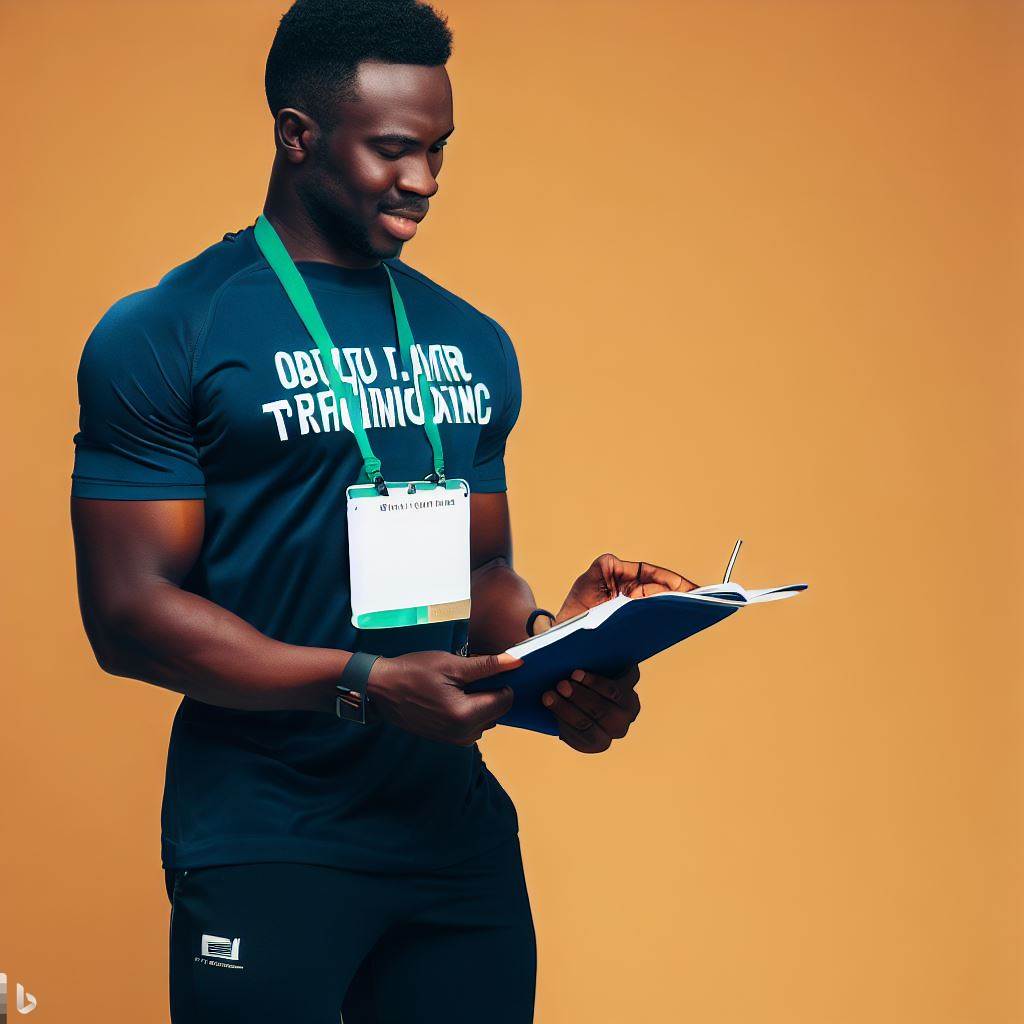Introduction
Explore the intricacies of Nigerian sports as we delve into the world of Assistant Coach Challenges, shedding light on their unique trials.
In the thrilling world of Nigerian sports, the role of an assistant coach is both demanding and rewarding.
Imagine yourself on the sidelines of a packed stadium, the weight of expectations on your shoulders.
As an assistant coach in Nigerian sports, you’re more than a strategist; you’re a motivator, mentor, and often a silent hero.
This chapter delves into the unique challenges faced by assistant coaches in Nigeria’s diverse sporting landscape.
From the fierce competition for coaching positions to navigating the complex relationships with head coaches, players, and fans, the journey of an assistant coach is not for the faint-hearted.
Beyond the glamour of the game, we’ll uncover the grueling hours of preparation, the need to balance player development with team performance, and the constant pressure to deliver results.
It’s a high-stakes role where decisions made in split seconds can define victory or defeat.
While the challenges are undeniable, so are the opportunities for growth, impact, and personal fulfillment.
Role and Responsibilities of an Assistant Coach
Duties and responsibilities of an assistant coach in Nigerian sports
An assistant coach in Nigerian sports has various duties and responsibilities, including:
- Assisting the head coach in developing and implementing training programs and game strategies.
- Conducting skill-specific training sessions and providing individualized coaching to players.
- Providing feedback and constructive criticism to players to help them improve their skills.
- Assisting in scouting for talent and recruiting players who can contribute to the team’s success.
- Collaborating with the head coach to analyze opponents’ strategies and develop counter-tactics.
- Maintaining open communication with players, addressing their concerns, and offering support and motivation.
- Assuming the responsibilities of the head coach in their absence, making important decisions during games.
- Contributing to the overall development and success of the team through effective coaching techniques.
How assistant coaches support the head coach in achieving team goals
Assistant coaches play a crucial role in supporting the head coach in achieving the team’s goals by:
- Assisting in planning and organizing practice sessions, ensuring they align with the team’s objectives.
- Coordinating with other members of the coaching staff to create a cohesive and comprehensive training program.
- Observing and analyzing players’ performances during training and games, providing valuable insights to the head coach.
- Providing individualized attention to players and addressing their specific needs and areas for improvement.
- Taking charge of specific aspects of the team’s development, such as defensive strategies or set pieces.
- Acting as a liaison between the head coach and players, conveying instructions and ensuring clarity in communication.
- Assuming a leadership role when the head coach is unavailable, making critical decisions during games.
- Offering guidance and support to players, fostering a positive and unified team environment.
Importance of effective teamwork and communication within the coaching staff
Effective teamwork and communication within the coaching staff are crucial for the overall success of the team:
- Collaboration among coaches ensures that the team’s strategies and goals are aligned and consistently emphasized.
- Open communication facilitates the exchange of knowledge, ideas, and feedback, leading to improved coaching techniques.
- Clear communication between the head coach and assistant coaches ensures that instructions are understood and executed properly.
- Teamwork allows coaches to divide responsibilities, maximizing efficiency and focus on specific areas of expertise.
- Unity among the coaching staff sets an example for players, promoting unity and a strong team culture.
- Effective communication within the coaching staff helps create a supportive and inclusive environment for players.
- Coaches can provide timely feedback to each other, enabling continuous improvement and growth as a coaching team.
- Effective teamwork and communication foster trust and camaraderie among the coaching staff, enhancing overall team performance.
In review, assistant coaches in Nigerian sports carry out various duties and responsibilities, supporting the head coach in achieving the team’s goals.
Effective teamwork and communication within the coaching staff are crucial for success in Nigerian sports, fostering an environment of collaboration and continuous improvement.
Lack of Recognition and Financial Constraints
Challenges in terms of recognition and appreciation
Assistant coaches often face the challenge of not receiving adequate recognition and appreciation for their contributions.
They work tirelessly behind the scenes, assisting head coaches in training athletes and developing strategies.
Their efforts are often overshadowed by the achievements of the head coach or the star players.
This lack of recognition can be demoralizing and make assistant coaches feel undervalued in their roles.
Without proper acknowledgement, they may struggle to find motivation and job satisfaction.
Assistant coaches need to be appreciated for their hard work and dedication, as they play a vital role in the success of a sports team.
Financial limitations hindering dedication
An additional challenge faced by assistant coaches is the financial constraints they often encounter.
In Nigerian sports, assistant coaches may not receive lucrative salaries compared to head coaches or players.
They often have to take on multiple jobs or rely on other sources of income to support themselves and their families.
This financial burden can distract assistant coaches from fully dedicating themselves to their coaching roles.
They have to juggle their coaching responsibilities with the need to earn a decent living.
Due to these financial limitations, assistant coaches may not have the resources or time to attend coaching seminars or acquire additional certifications.
Stories emphasizing the impact of these challenges
The challenges of recognition and financial constraints can have a profound effect on assistant coaches.
One assistant coach, John, shared his struggle with lack of recognition when his team won a championship.
While he played a crucial role in preparing the team, the media and fans attributed all the glory to the head coach and star players.
This experience left John feeling unappreciated, which affected his motivation and enthusiasm for the job.
In terms of financial limitations, another assistant coach, Sarah, faced difficulties in making ends meet.
She had to balance her coaching duties with working part-time as a personal trainer to support her family.
This left her with little time and energy to devote to training sessions and player development.
Stories like these highlight the real-life impact of the challenges faced by assistant coaches in Nigerian sports.
They demonstrate the urgent need for recognition and financial support in order to retain and motivate talented assistant coaches.
Read: Roles of an Assistant Coach in Nigerian Sports Teams
Limited Opportunities for Career Growth
Scarcity of progression opportunities for assistant coaches in Nigerian sports
- Assistant coaches in Nigerian sports often face a scarcity of opportunities for career growth.
- Despite their dedication and hard work, assistant coaches have limited chances to progress in their coaching careers.
- This scarcity of progression can be attributed to various factors within the Nigerian sports system.
- One main reason is the dominance of head coaches who often resist sharing their responsibilities with their assistants.
- Additionally, the lack of structured career pathways within Nigerian sports organizations further hinders assistant coaches’ career growth.
- The absence of a clear promotion system creates a sense of stagnation among assistant coaches.
Difficulties encountered in terms of advancement, both within their current teams and in seeking opportunities elsewhere
- Assistant coaches face difficulties in advancing within their current teams due to limited promotion prospects.
- They often find themselves stuck in their current position with little room for growth or development.
- Furthermore, assistant coaches also struggle to find opportunities elsewhere as head coaching positions are highly competitive.
- Many assistant coaches are forced to remain in their roles for an extended period, hindering their career advancement.
- The lack of recognition and support from sports authorities and organizations also contributes to their difficulties in seeking new opportunities.
Potential solutions or recommendations to overcome these challenges
- It is essential for Nigerian sports organizations to implement a structured career progression system for assistant coaches.
- This system should include clear criteria for promotion and provide coaches with opportunities to enhance their skills and qualifications.
- Nigerian sports authorities should also focus on encouraging head coaches to delegate responsibilities and involve their assistant coaches more actively.
- Organizations can introduce mentorship programs where experienced head coaches guide and support assistant coaches in their career growth.
- Moreover, creating platforms for assistant coaches to showcase their abilities, such as coaching workshops or seminars, can help increase their visibility and career prospects.
- Finally, sports organizations must prioritize investment in the development and training of assistant coaches to ensure their continuous professional growth.
Overall, assistant coaches in Nigerian sports face significant challenges regarding career growth.
The scarcity of opportunities, both within their current teams and in seeking new positions, hampers their professional advancement.
However, by implementing structured career progression systems, encouraging delegation by head coaches, and investing in their development, these challenges can be overcome.
It is crucial for Nigerian sports authorities and organizations to recognize and support the crucial role that assistant coaches play and provide them with the necessary opportunities to excel in their coaching careers.
Read: The Career Path of an Assistant Coach in Nigeria
Managing High Expectations and Pressure
Pressure assistant coaches face from players, fans, and team management
Being an assistant coach in Nigerian sports comes with immense pressure and high expectations from various stakeholders.
Players are constantly looking up to assistant coaches for guidance and support, adding to the pressure on them.
Fans, who are passionate about their teams, have high expectations and can be very demanding when results are not met.
Team management, including the head coach and administrative staff, often place additional pressure on assistant coaches to deliver positive outcomes.
Impact of high expectations on job performance and personal well-being
The weight of high expectations can have a significant impact on the job performance and personal well-being of assistant coaches.
They might feel overwhelmed, leading to a decline in their performance and ability to make sound decisions.
The constant pressure can have detrimental effects on their mental and physical health.
This increased stress can evoke feelings of anxiety, burnout, and even impact their personal relationships and overall happiness.
Strategies and techniques to effectively handle stress and maintain a positive mindset
To effectively handle stress and maintain a positive mindset, assistant coaches can employ various strategies and techniques.
- Develop strong communication skills to effectively manage expectations of players, fans, and team management.
- Set realistic goals and manage them in a well-structured manner, ensuring steady progress.
- Build a support network of fellow coaches, mentors, or friends in the industry to provide guidance and encouragement.
- Prioritize self-care by engaging in activities that promote relaxation and reduce stress, such as exercise, meditation, or hobbies.
- Adopt a growth mindset, viewing challenges as opportunities to learn and grow, rather than sources of pressure.
- Seek professional help if needed, such as counseling or therapy, to address any overwhelming emotions or mental health concerns.
- Utilize time management techniques, such as prioritizing tasks and delegating responsibilities effectively.
- Reflect on past successes and accomplishments to boost confidence and maintain a positive perspective.
By implementing these strategies, assistant coaches can better manage high expectations and pressure, leading to improved job performance and enhanced personal well-being.
Read: Sports Nutrition Trends in Nigeria: A 2023 Outlook

Limited Resources and Facilities
Challenges assistant coaches encounter due to inadequate resources and facilities
Assistant coaches in Nigerian sports face numerous challenges due to limited resources and facilities.
These challenges hinder their ability to effectively carry out their duties and have a negative impact on the overall development of the teams they work with.
One major challenge is the lack of financial resources. Assistant coaches often struggle to secure funding for necessary equipment, training camps, and travel expenses.
Without adequate funding, they are unable to provide their athletes with the necessary tools and opportunities for improvement.
Another challenge is the scarcity of training facilities.
Many assistant coaches are forced to work with substandard facilities or even share them with other teams and athletes.
This limits their ability to schedule training sessions and can hinder the progress of their athletes.
Impact on training sessions, team development, and performance
The limited resources and facilities available to assistant coaches have a significant impact on training sessions, team development, and performance.
Firstly, inadequate resources make it difficult for assistant coaches to plan and execute effective training sessions.
Without proper equipment, athletes may not be able to train at their full potential, leading to slower progress in skill development.
This can also result in a lack of motivation among athletes, as they may feel discouraged by the lack of support.
Furthermore, the scarcity of facilities affects team development. Assistant coaches may struggle to find suitable venues for practice and competition.
This can lead to a lack of consistency in training, as athletes are unable to find a regular space to hone their skills.
As a result, team cohesion and coordination suffer, hindering overall development.
Finally, limited resources and facilities also impact team performance. Without access to state-of-the-art facilities or proper training equipment, athletes may struggle to compete at their best.
This puts Nigerian sports teams at a disadvantage when competing against teams from countries with better resources.
Suggestions for how assistant coaches can work around these limitations and still achieve success
While the challenges posed by limited resources and facilities are significant, assistant coaches can implement strategies to work around these limitations and still achieve success.
Firstly, they can seek alternative sources of funding through sponsorships and partnerships with local businesses.
This can help alleviate the financial burden and ensure that essential resources and facilities are available to the team.
Additionally, assistant coaches can optimize the use of available resources by implementing creative training methods.
They can focus on exercises that require minimal equipment or make use of improvised training tools. By thinking outside the box, they can still provide effective training sessions despite limited resources.
Collaboration with other teams and athletes can also be beneficial. Assistant coaches can schedule joint training sessions or share facilities with other teams to make the most of available resources.
This not only fosters a sense of community among athletes but also allows for the exchange of knowledge and experience.
Furthermore, assistant coaches can advocate for improved resources and facilities by engaging with relevant sports authorities and government agencies.
By highlighting the impact of limited resources on team performance and development, they can raise awareness and possibly secure additional support.
In essence, the challenges posed by limited resources and facilities in Nigerian sports present significant obstacles for assistant coaches.
However, by implementing creative solutions, seeking alternative funding sources, and fostering collaboration, assistant coaches can work around these limitations and still achieve success in developing their teams and athletes.
Read: Nigeria’s Assistant Coach Certification Explained
Building Strong Relationships with Players
Importance of developing positive relationships with athletes
Developing positive relationships with athletes is crucial for an assistant coach in Nigerian sports.
Building strong connections with players helps to create a harmonious atmosphere within the team.
Positive relationships foster trust, which is essential for effective communication and teamwork.
When players trust their coach, they are more likely to listen to instructions and put in their best effort.
Assistant coaches who have positive relationships with athletes can better understand their strengths, weaknesses, and motivations.
These insights enable them to tailor their coaching methods to suit individual players, optimizing performance and development.
Challenges in gaining trust, motivating players, and resolving conflicts
Gaining trust from players can be challenging for an assistant coach in Nigerian sports.
Publish Your Professional Profile, Business or Brand
Showcase your expertise, gain trust, and boost visibility instantly on Professions.ng.
Publish NowPlayers may be skeptical of new coaches, especially if they have had negative experiences in the past.
Assistant coaches must establish credibility by demonstrating their knowledge, skills, and dedication to the team.
Motivating players can be difficult, as each athlete has unique motivations and triggers.
Some players may lack self-motivation, requiring the assistant coach to provide constant encouragement and support.
Resolving conflicts within the team is another challenge.
Different personalities, egos, and personal agendas can create tensions that affect team harmony and performance.
Assistant coaches must be skilled in conflict resolution and create an environment where open communication is encouraged.
Establishing strong connections with team members
Assistant coaches can establish strong connections with team members by following these practical tips:
- Be approachable and accessible: Assistant coaches should make themselves available to players, both on and off the field.
- Show genuine interest: Take the time to get to know each player individually, their goals, strengths, and challenges.
- Communicate effectively: Use clear and concise language, actively listen to players, and provide constructive feedback.
- Build trust: Keep promises, maintain confidentiality, and be consistent in your actions and decisions.
- Foster team unity: Encourage team-building activities and create opportunities for players to bond and support each other.
- Recognize and celebrate achievements: Acknowledge individual and team successes, both big and small.
- Be a positive role model: Lead by example, demonstrating professionalism, dedication, and a strong work ethic.
- Empower players: Give them autonomy and responsibility, allowing them to contribute to team decisions and problem-solving.
- Manage conflicts calmly: When conflicts arise, address them promptly and fairly, promoting open dialogue and understanding.
- Continuously learn and improve: Stay updated on the latest coaching techniques, attend workshops, and seek feedback from players.
By prioritizing the development of positive relationships with athletes, assistant coaches can contribute to the overall success of the team.
Conclusion
A critical examination of the challenges faced by assistant coaches in Nigerian sports reveals the vital role they play in the development and success of athletes and teams.
Throughout this blog post, several key points have been discussed.
Firstly, assistant coaches often face a lack of recognition and appreciation for their efforts.
Despite their significant contributions to the coaching staff, they are often overshadowed by head coaches. Their expertise and dedication deserve acknowledgment.
Secondly, assistant coaches face challenges in terms of limited resources and funding. This hampers their ability to provide optimal training and support for athletes.
However, they manage to navigate these obstacles and continue to push for excellence.
Additionally, the hierarchical structure within Nigerian sports can create a power dynamic that hinders assistant coaches from effectively implementing their strategies and ideas.
Their voice and input should be valued and taken into consideration by the entire coaching staff.
Ultimately, assistant coaches are the unsung heroes of Nigerian sports. It is crucial to appreciate their tireless efforts and recognize their importance in the development of athletes and teams.
Let us celebrate them as vital members of the coaching staff and support their quest for excellence.
I encourage readers to share their thoughts and experiences as assistant coaches or express gratitude towards these unsung heroes in the comments section below.
Together, let us shed light on the challenges they face and advocate for change to create a more inclusive and supportive environment for assistant coaches in Nigerian sports.




